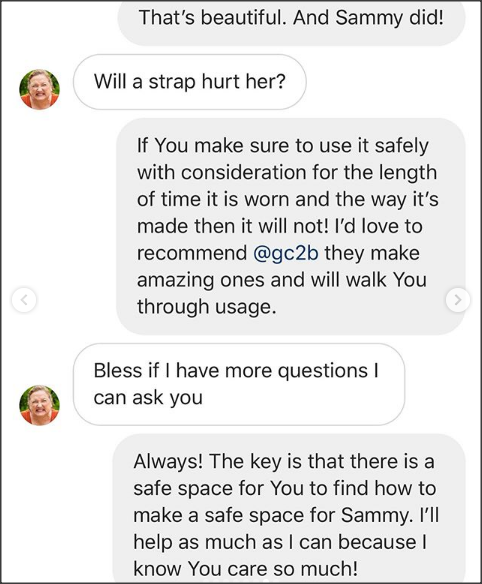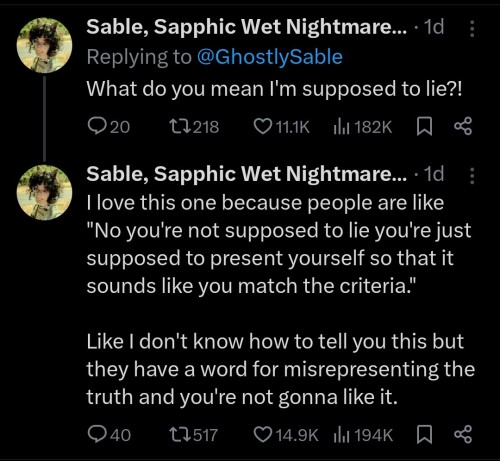Wiwan-the-farmer - Good Vibes

More Posts from Wiwan-the-farmer and Others


This is the funniest tweet I’ve ever seen.
A man is driving down the road and breaks down near a monastery. He goes to the monastery, knocks on the door, and says, “My car broke down. Do you think I could stay the night?” The monks graciously accept him, feed him dinner, even fix his car. As the man tries to fall asleep, he hears a strange sound. The next morning, he asks the monks what the sound was, but they say, “We can’t tell you. You’re not a monk.” The man is disappointed but thanks them anyway and goes about his merry way. Some years later, the same man breaks down in front of the same monastery. The monks accept him, feed him, even fix his car. That night, he hears the same strange noise that he had heard years earlier. The next morning, he asks what it is, but the monks reply, “We can’t tell you. You’re not a monk.” The man says, “All right, all right. I’m *dying* to know. If the only way I can find out what that sound was is to become a monk, how do I become a monk?” The monks reply, “You must travel the earth and tell us how many blades of grass there are and the exact number of sand pebbles. When you find these numbers, you will become a monk.” The man sets about his task. Forty-five years later, he returns and knocks on the door of the monastery. He says, “I have traveled the earth and have found what you have asked for. There are 145,236,284,232 blades of grass and 231,281,219,999,129,382 sand pebbles on the earth.” The monks reply, “Congratulations. You are now a monk. We shall now show you the way to the sound.” The monks lead the man to a wooden door, where the head monk says, “The sound is right behind that door.” The man reaches for the knob, but the door is locked. He says, “Real funny. May I have the key?” The monks give him the key, and he opens the door. Behind the wooden door is another door made of stone. The man demands the key to the stone door. The monks give him the key, and he opens it, only to find a door made of ruby. He demands another key from the monks, who provide it. Behind that door is another door, this one made of sapphire. So it went until the man had gone through doors of emerald, silver, topaz, and amethyst. Finally, the monks say, “This is the last key to the last door.” The man is relieved to no end. He unlocks the door, turns the knob, and behind that door he is amazed to find the source of that strange sound. But I can’t tell you what it is because you’re not a monk








Wow. The patience, kindness and calm communication skills. Outstanding.
From raindovemodel
“If I had time travel I’d kill Hitler” “If I had time travel I’d stop my favourite politician getting assassinated” you’re all thinking way too small. If I had time travel I’d stop Neil Armstrong and Buzz Aldrin from dying on the moon due to Soviet sabotage, kicking off the Great Nuclear War and devastating half of the planet.




thinking about this today


I see a lot of people throw around the term fascist on this website, but I’ve never seen a definition for it, so I’m going to provide one.
The definition of fascism, if you look it up in a dictionary, should sound something like this:
a populist political philosophy, movement, or regime that exalts nation and race above the individual, that is associated with an autocratic government
Source: Merriam-Webster
This definition of fascism notably includes both Nazism and Classical Fascism (Italian Fascism) but leaves out other Fascist movements, namely Brazilian Integralism and Falangism.
So to really understand Fascism, you must first understand the “arms” of what makes up a fascist government or movement.
The arms that I was taught are as follows:
1. Corporatism - the belief that class conflict is unnecessary and the various social classes must cooperate and do their job. Please note that it is used in other contexts, and Fascism usually adds on the caveat that the classes cooperate with the good of the state
2. Militarism - Fascist movement traditionally merge state & military, which goes with corporatism to militarize society into strict and rigid social hierarchies. This also has the added effect of making Fascist nations more belligerent but also more unstable, as a fascist military when overstepping its duties often contradicts official government policy (for an example, look up the Marco Polo bridge incident)
3. Hatred of intellectualism - fascist movements dislike intellectualism, as freedom of thought can contradict what they believe to be the one truth. This is an important time to tell you that Fascism is a reactionary movement. Fascists do not like change, and dream of an imagined past ideal society.
4. Violent rhetoric against communism - Fascist movements arose in Europe as a result of the ascendancy of the USSR. Many prominent fascists used the fear of communism to cement their power and initiate purges. Fascists dislike communism because communism advocates for abolition of class structure and social equality, neither of which fit with the nationalist & hierarchical view of Fascists.
5. Ultra-nationalism & supremacy of the state - these two go hand in hand, as Fascists believe their nation to be above all else, superior and unbeatable in every way to every other country in the world. The state is the supreme power in fascist nations, and compliance is not expected as much demanded from all citizens. This often ties into racist views of fascists, who believe their race, similar to their nation, to be superior to all else. It is important to note that some fascist movements were not as extreme in the race department, as Integralism advocated for people of all races co-existing, so long as they were subservient to the states will, and Falangism believed that all Hispanic peoples (Spaniards, non-Brazilian South Americans, Latinos, Mexicans, and Philipinos) were all part of the super race, and should interbreed to create superhumans.
6. One leader - fascist movements have one person who is viewed as supreme & infallible, who wields autocratic authority over every aspect of the state and is treated as though they are the nation in many cases.
7. Feeling of national humiliation - fascist movements often espouse that their country has been slighted or humiliated by their allies or rivals in the past, and that the only way to make up for this stain on national honor is to expel those who humiliated the country (often ethnic minorities) and create a homogeneous and pure society
8. Mass media & propaganda - Fascism uses false statements and misinformation as propaganda to cement their authority and make their influence complete.
So with all of that in mind here are some prominent fascist governments both in history and modern day:
1. Italian fascism, aka classical fascism was started by Benito Mussolini and was the offical ideology of Italy until the end of WWII. Corporatism was the biggest tenant of this branch, along with a strong feeling of national betrayal by the allies in WWI.
2. Nazism, a movement that existed after WWI was taken up by Austrian politician Adolf Hitler, who led Germany until his death in 1945. Nazism called for racial purity, and used anti-Semitic & slavophobic rhetoric, all of which eventually led to the invasion of Poland (a Slavic country with a large Jewish population) and the start of WWII
3. Francoism / Falangism were competing Spanish ultranationalist ideologies following the conclusion of the Spanish civil war. Dictators Franz Franco won out and his ideology would rule Spain until the 1970s. The linguistic discrimination used by Francoism laid the groundwork for the modern Catalan & Basque independence movements
4. The Japanese military ruled Japan in a military dictatorship during WWII, and used fascist rhetoric and tactics, coupled with Japanese society being already arranged in a way to facilitate this, and supreme loyalty to the Emperor. The movement died out after WWII and the US occupation of Japan, as the Japanese military was formally disbanded and downsized immensely
5. Yes by my definition, Trumpism is a fascist movement. Please note that Trump is not a Nazi, he is a fascist and more specifically a Trumpist.
6. There were many smaller and less significant fascist countries during WWII and after, but I don’t know enough about none of them to say definitively if they were / are
-
 xx-ika-makkuro-xx liked this · 1 month ago
xx-ika-makkuro-xx liked this · 1 month ago -
 thehumanslur reblogged this · 1 month ago
thehumanslur reblogged this · 1 month ago -
 thehumanslur liked this · 1 month ago
thehumanslur liked this · 1 month ago -
 khomenibaby reblogged this · 1 month ago
khomenibaby reblogged this · 1 month ago -
 mahou-josei reblogged this · 1 month ago
mahou-josei reblogged this · 1 month ago -
 liquinoar liked this · 1 month ago
liquinoar liked this · 1 month ago -
 midnightnautilus reblogged this · 1 month ago
midnightnautilus reblogged this · 1 month ago -
 stevenroogers reblogged this · 1 month ago
stevenroogers reblogged this · 1 month ago -
 cypresstiger reblogged this · 1 month ago
cypresstiger reblogged this · 1 month ago -
 seethinglikeme liked this · 1 month ago
seethinglikeme liked this · 1 month ago -
 mayonnaiseolivia liked this · 1 month ago
mayonnaiseolivia liked this · 1 month ago -
 lindaloveliver reblogged this · 1 month ago
lindaloveliver reblogged this · 1 month ago -
 lavenderwinds reblogged this · 1 month ago
lavenderwinds reblogged this · 1 month ago -
 federal-bureau-of-nerds reblogged this · 1 month ago
federal-bureau-of-nerds reblogged this · 1 month ago -
 witchy-ghuleh liked this · 1 month ago
witchy-ghuleh liked this · 1 month ago -
 austsakurakyzor reblogged this · 1 month ago
austsakurakyzor reblogged this · 1 month ago -
 hughdiligence reblogged this · 1 month ago
hughdiligence reblogged this · 1 month ago -
 hughdiligence liked this · 1 month ago
hughdiligence liked this · 1 month ago -
 alolanroy reblogged this · 1 month ago
alolanroy reblogged this · 1 month ago -
 ultranova75 reblogged this · 1 month ago
ultranova75 reblogged this · 1 month ago -
 othermart reblogged this · 1 month ago
othermart reblogged this · 1 month ago -
 davidhalleristireofurbs reblogged this · 1 month ago
davidhalleristireofurbs reblogged this · 1 month ago -
 dawngabriel reblogged this · 1 month ago
dawngabriel reblogged this · 1 month ago -
 corruptedremnant reblogged this · 1 month ago
corruptedremnant reblogged this · 1 month ago -
 crayonpencil liked this · 1 month ago
crayonpencil liked this · 1 month ago -
 scribbledmelancholic liked this · 1 month ago
scribbledmelancholic liked this · 1 month ago -
 kelpology reblogged this · 1 month ago
kelpology reblogged this · 1 month ago -
 lachiamavanolouomocane liked this · 1 month ago
lachiamavanolouomocane liked this · 1 month ago -
 metalcrows liked this · 1 month ago
metalcrows liked this · 1 month ago -
 haven-for-maven-ravens reblogged this · 1 month ago
haven-for-maven-ravens reblogged this · 1 month ago -
 haven-for-maven-ravens reblogged this · 1 month ago
haven-for-maven-ravens reblogged this · 1 month ago -
 inks-stupid-lil-basement reblogged this · 1 month ago
inks-stupid-lil-basement reblogged this · 1 month ago -
 undeadfake liked this · 1 month ago
undeadfake liked this · 1 month ago -
 maybeagoose liked this · 2 months ago
maybeagoose liked this · 2 months ago -
 a-thousand-pots liked this · 2 months ago
a-thousand-pots liked this · 2 months ago -
 cheese-is-a-milk-loaf reblogged this · 2 months ago
cheese-is-a-milk-loaf reblogged this · 2 months ago -
 worldweary-walker reblogged this · 2 months ago
worldweary-walker reblogged this · 2 months ago -
 21stcenturyschizoidfag liked this · 2 months ago
21stcenturyschizoidfag liked this · 2 months ago -
 senysti reblogged this · 2 months ago
senysti reblogged this · 2 months ago -
 coffeecatty reblogged this · 2 months ago
coffeecatty reblogged this · 2 months ago -
 an-actual-literal-egg reblogged this · 2 months ago
an-actual-literal-egg reblogged this · 2 months ago -
 danhighland liked this · 2 months ago
danhighland liked this · 2 months ago -
 liatai reblogged this · 2 months ago
liatai reblogged this · 2 months ago -
 teogobrr liked this · 2 months ago
teogobrr liked this · 2 months ago -
 chooblogs liked this · 2 months ago
chooblogs liked this · 2 months ago -
 impanica liked this · 2 months ago
impanica liked this · 2 months ago -
 femmeknights reblogged this · 2 months ago
femmeknights reblogged this · 2 months ago -
 newtloss reblogged this · 2 months ago
newtloss reblogged this · 2 months ago
